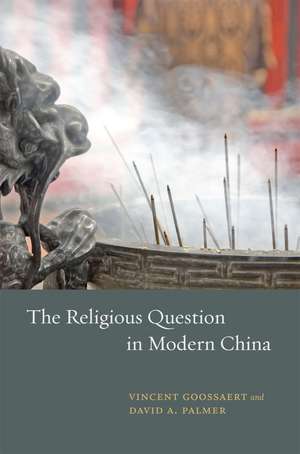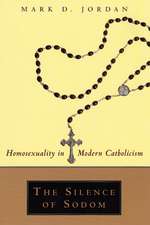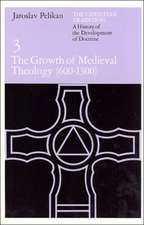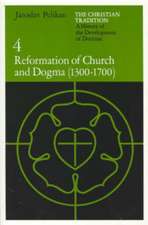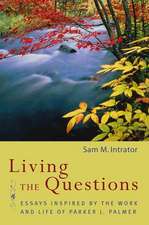The Religious Question in Modern China
Autor Vincent Goossaert, David A. Palmeren Limba Engleză Hardback – 18 apr 2011
Vezi toate premiile Carte premiată
PROSE (2011)
Vincent Goossaert and David A. Palmer piece together the puzzle of religion in China not by looking separately at different religions in different contexts, but by writing a unified story of how religion has shaped, and in turn been shaped by, modern Chinese society. From Chinese medicine and the martial arts to communal temple cults and revivalist redemptive societies, the authors demonstrate that from the nineteenth century onward, as the Chinese state shifted, the religious landscape consistently resurfaced in a bewildering variety of old and new forms. The Religious Question in Modern China integrates historical, anthropological, and sociological perspectives in a comprehensive overview of China’s religious history that is certain to become an indispensible reference for specialists and students alike.
Preț: 490.42 lei
Preț vechi: 616.04 lei
-20% Nou
Puncte Express: 736
Preț estimativ în valută:
93.85€ • 97.39$ • 78.44£
93.85€ • 97.39$ • 78.44£
Carte indisponibilă temporar
Doresc să fiu notificat când acest titlu va fi disponibil:
Se trimite...
Preluare comenzi: 021 569.72.76
Specificații
ISBN-13: 9780226304168
ISBN-10: 0226304167
Pagini: 480
Dimensiuni: 152 x 229 x 33 mm
Greutate: 0.75 kg
Ediția:New.
Editura: University of Chicago Press
Colecția University of Chicago Press
ISBN-10: 0226304167
Pagini: 480
Dimensiuni: 152 x 229 x 33 mm
Greutate: 0.75 kg
Ediția:New.
Editura: University of Chicago Press
Colecția University of Chicago Press
Notă biografică
Vincent Goossaert is deputy director of the Groupe Sociétés, Religions, Laïcités at the Centre national de la recherche scientifique, Paris. He is the author of The Taoists of Peking, 1800–1949: A Social History of Urban Clerics, among other books. David A. Palmer is assistant professor in the Department of Sociology at the University of Hong Kong. He is the author of Qigong Fever: Body, Science, and Utopia in China, among other books.
Cuprins
Acknowledgments
A Note on Translations, Character Sets, and Abbreviations
Introduction
PART I Religions and Revolutions
1. The Late Qing Religious Landscape
2. Ideology, Religion, and the Construction of a Modern State, 1898–1937
3. Model Religions for a Modern China: Christianity, Buddhism, and Religious Citizenship
4. Cultural Revitalization: Redemptive Societies and Secularized Traditions
5. Rural Resistance and Adaptation, 1898–1949
6. The CCP and Religion, 1921–66
7. Spiritual Civilization and Political Utopianism
PART II Multiple Religious Modernities: Into the Twenty-First Century
8. Alternative Trajectories for Religion in the Chinese World
9. Filial Piety, the Family, and Death
10. Revivals of Communal Religion in the Later Twentieth Century
11. The Evolution of Modern Religiosities
12. Official Discourses and Institutions of Religion
13. Global Religions, Ethnic Identities, and Geopolitics
Conclusion
Bibliography
Index
A Note on Translations, Character Sets, and Abbreviations
Introduction
PART I Religions and Revolutions
1. The Late Qing Religious Landscape
2. Ideology, Religion, and the Construction of a Modern State, 1898–1937
3. Model Religions for a Modern China: Christianity, Buddhism, and Religious Citizenship
4. Cultural Revitalization: Redemptive Societies and Secularized Traditions
5. Rural Resistance and Adaptation, 1898–1949
6. The CCP and Religion, 1921–66
7. Spiritual Civilization and Political Utopianism
PART II Multiple Religious Modernities: Into the Twenty-First Century
8. Alternative Trajectories for Religion in the Chinese World
9. Filial Piety, the Family, and Death
10. Revivals of Communal Religion in the Later Twentieth Century
11. The Evolution of Modern Religiosities
12. Official Discourses and Institutions of Religion
13. Global Religions, Ethnic Identities, and Geopolitics
Conclusion
Bibliography
Index
Recenzii
“Building on a burgeoning wave of scholarship on Chinese religion over the past fifteen years, Vincent Goossaert and David A. Palmer offer a highly convincing narrative framework for understanding what religion was in late imperial China, what it became under the secularizing agendas of China’s twentieth-century governments, and what it might become in the global world of the future. In The Religious Question in Modern China, we are in the ring with religions and the secularized states that would like to remodel or rid themselves of them—and we get to watch them flail away at each other. This is a tremendous scholarly achievement.”
“This is a pioneering and original work of scholarship that redefines the role of religion in modern Chinese history. With significant new data that provide a powerful challenge to conventional secularist narratives of China’s modernization, this book will contribute to a major rethinking of religion’s importance in Chinese modernity. Experts and casual readers alike will benefit immensely from its publication.”
“The Religious Question in Modern China is a timely contribution to a maturing field of inquiry. Vincent Goossaert and David A. Palmer assemble a comprehensive overview of the role of religion in Chinese society from the late nineteenth century to the present. This milestone work simultaneously represents the state of the field and defines the agenda for future studies.”
“Indispensible for anyone seeking to understand the religious landscape and state-religion interactions in modern and contemporary China.”
“Those who want to learn about the situation of religion in modern China should start here.”
“[Goossaert and Palmer’s] book takes into account the huge wealth of insights into Chinese religion accumulated by the new research, and gives a very clearly written account of a truly remarkable event: the destruction of one of the world’s richest religious traditions and its replacement by a congress of competing traditions, faiths, and beliefs.”
“A brilliant synthesis and update of the research undertaken by Chinese and Western scholars over the past two decades on the relationship between the political and the religious spheres in China since the Hundred Day Reform. . . . This book represents a masterful introduction to the complexity of Chinese religiosity, but it will also constitute a source of inspiration for many research agenda.”
“This outstanding book provides valuable findings and insights on the centrality of religion in modern China.”
“The Religious Question is an excellent work, and it makes an ideal textbook for both undergraduate and postgraduate classes on Chinese religion.”
“The sheer scope of [the authors’] research and their ability to channel formidably diverse material into a cogent narrative make for a masterly summation of the changes in China’s religious landscape over the past century.”
“Goossaert and Palmer’s volume on the religious question in modern China is one of the best books on this topic in recent years.”
“A landmark book that will be a point of reference for the field for many years to come.”
“The most remarkable feature of the work is the example that it sets for interdisciplinary collaboration, bringing together insights from history, religion, sociology, and anthropology.”
“This book raises important religious questions and deserves to be read not only by China specialists and the sociologists of religion, but by anyone who is interested in the modern history of China.”
“This volume will probably remain a must-read for years to come for anyone hoping to gain a wider grasp and deeper understanding of what its title calls the religious question in modern China.”
“Goossaert and Palmer succeed wonderfully in their attempt to unpack complex, intertwined issues and to highlight lines of intelligibility facilitating our understanding of the present situation. The result is a seminal work which will undoubtedly have a long-lasting impact on the field.”
“This book provides an impressive synthesis of the burgeoning literature on religion in China.”
“Goossaert and Palmer give us a holistic, comprehensive analysis of the religious system in modern China, along with the trajectory of religion-modernity-secularism. . . . With its broad scope and comprehensive analysis, [The Religious Question in Modern China] is especially inspiring to scholars based in mainland China. The socio-historical approach is highly appreciated.”
Premii
- PROSE Winner, 2011
